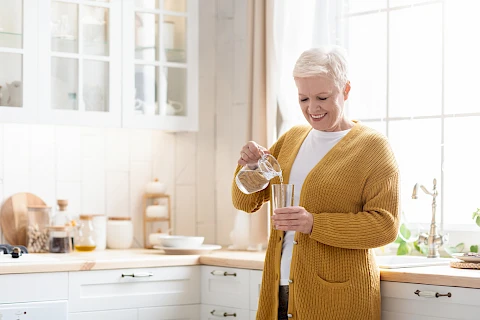
November marks National Healthy Skin Month, a great time to focus on the skin health of our senior loved ones. As we age, taking care of our skin becomes even more critical because senior skin is more fragile and can develop various issues. Caregivers should learn tips to better support senior skin health and keep their loved ones looking and feeling their best.
What to Know About Senior Skin
As we grow older, our skin undergoes several changes. It becomes thinner, drier, and less elastic. These changes make it more vulnerable to bruises, tears, and infections. Seniors often face common skin issues such as dryness, itching, and age spots. More serious concerns can include pressure sores and skin infections. Therefore, proactive skin care is necessary for seniors to maintain healthy and comfortable skin.
Gentle Skincare Routines
Choosing the right skincare products is the first step to a gentle routine. Look for products labeled as fragrance-free and designed for sensitive skin. Avoid harsh soaps and opt for mild cleansers. A simple skincare routine can work wonders. Start with cleansing the skin gently each day. Pat the skin dry with a soft towel and avoid rubbing. Follow up with a moisturizing lotion to lock in moisture. Encourage seniors to moisturize twice per day, as this helps keep the skin hydrated and reduces itchiness.
Applying Sunscreen
Just because we've reached November does not mean that sunscreen is no longer needed. Sunscreen is not only a summer thing. Everyone should use it year-round to prevent sun damage to the skin. Help your senior loved ones apply sunscreen to any exposed skin any time they leave the house to ensure they're protected.
Promoting Hydration
Hydration helps maintain skin health. Proper hydration keeps the skin plump and elastic, making it less susceptible to damage. Encourage seniors to drink eight glasses of water per day, or more if possible. Some find it helpful to keep a water bottle nearby as a reminder. In addition to water, foods like cucumbers, oranges, and watermelon are hydrating and benefit the skin. Adding these to their diet can improve overall hydration levels.
Monitoring for Skin Problems
Regular monitoring can help catch skin problems early. Be on the lookout for red or irritated areas, bruises, or any changes in skin appearance. Common skin issues in seniors can include rashes, sores, or unusual growths. Conducting regular skin checks can prevent minor irritations from developing into serious problems. If you notice any persistent or concerning issues, don't hesitate to seek medical advice. Early treatment is often best for addressing skin problems effectively.
Get Additional Support From Senior Helpers Cheyenne
Supporting senior skin health is an important part of caregiving. By following these tips, caregivers can help maintain their loved one's skin health throughout November and beyond. Remember, simple routines, hydration, and regular monitoring can make a big difference. If you need additional support, Senior Helpers Cheyenne is here to help. Our compassionate team provides professional caregiving services in Laramie and Cheyenne. Contact us for advice or to learn more about how we can assist you and your loved ones.